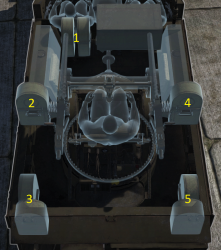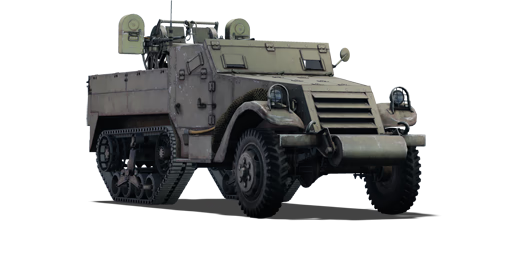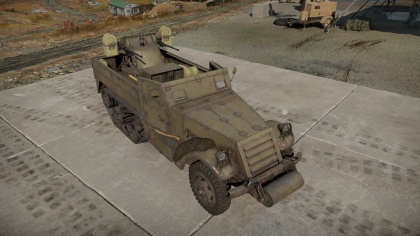M13 MGMC
Contents
Description
The Multiple Gun Motor Carriage M13 is a rank I American Self-Propelled Anti-Aircraft (SPAA) vehicle
with a battle rating of 1.3 (AB) and 1.7 (RB/SB). It was one of the first American tanks to be released with the American ground tree in Update 1.45 "Steel Generals".
The M13 MGMC is an M3 half-track with a dual-mounted .50 calibre M2 Browning machine guns on the rear. The .50 calibre machine guns are mounted in a Maxson M33 Twin Mount. Each machine gun has 200 rounds each, giving it a total of 400 rounds before reloads. Due to this armament, the M13 is foremost an SPAA that relies on its mobility and fire rate to destroy aircraft, or very thinly-armoured tanks. However, when compared to other tanks of its rank, the M13 is a relatively weak vehicle. The MG-only armament gives the M13 exceptional AAA potential, but not much else.
General info
Survivability and armour
Armour type:
- Rolled homogeneous armour
- Structural Steel (Gun breech, Suspension)
| Armour | Front (Slope angle) | Sides | Rear | Roof |
|---|---|---|---|---|
| Hull | 6 mm (31°) Hood front 13 mm (31°) Driver port |
6 mm | 6 mm | 6 mm Engine Compartment |
| Turret | 13 mm | 6 mm | N/A | N/A |
Notes:
- Tracks are 7 mm thick.
- Chassis are 10 mm thick, while the caterpillar wheels are 15 mm thick.
- Wheels are 2 mm thick.
Mobility
| Game Mode | Max Speed (km/h) | Weight (tons) | Engine power (horsepower) | Power-to-weight ratio (hp/ton) | |||
|---|---|---|---|---|---|---|---|
| Forward | Reverse | Stock | Upgraded | Stock | Upgraded | ||
| Arcade | 80 | 19 | 8.3 | 210 | 282 | 25.3 | 33.98 |
| Realistic | 73 | 17 | 131 | 148 | 15.78 | 17.83 | |
Armaments
Main armament
| 12.7 mm M2HB (x2) | Turret rotation speed (°/s) | Reloading rate (seconds) | ||||||||||||
|---|---|---|---|---|---|---|---|---|---|---|---|---|---|---|
| Mode | Capacity (Belt) | Fire rate | Vertical | Horizontal | Stabilizer | Stock | Upgraded | Full | Expert | Aced | Stock | Full | Expert | Aced |
| Arcade | 4,800 (200) | 577 | -10°/+90° | ±180° | N/A | 52.84 | 73.13 | 88.80 | 98.20 | 104.47 | 10.40 | 9.20 | 8.48 | 8.00 |
| Realistic | 35.70 | 42.00 | 51.00 | 56.40 | 60.00 | |||||||||
Ammunition
- Common: API-T · I · AP · API-T - These rounds work well until the others are researched.
- API: API-T · AP-I · API-T - These are absolutely devastating in the AA role with slightly less performance against enemy tanks than AP.
- AP: AP · AP · API-T - These are best against enemy tanks at close range and do good damage to planes.
- APIT: API-T - Better than API in all regards but not as good against tanks as AP, this is the belt of choice in almost all situations. Since every bullet is a tracer, it makes destroying aircraft much easier and detectability is not greatly increased over AP-I, however is increased a bit over AP.
| Penetration statistics | ||||||
|---|---|---|---|---|---|---|
| Belt | Penetration @ 0° Angle of Attack (mm) | |||||
| 10 m | 100 m | 500 m | 1,000 m | 1,500 m | 2,000 m | |
| Common | 31 | 30 | 26 | 22 | 18 | 15 |
| API | 30 | 29 | 24 | 20 | 16 | 13 |
| AP | 31 | 30 | 26 | 22 | 18 | 15 |
| APIT | 30 | 29 | 24 | 20 | 16 | 13 |
| Belt details | |||||||||
|---|---|---|---|---|---|---|---|---|---|
| Belt | Type of warhead |
Velocity (m/s) |
Projectile Mass (kg) |
Fuse delay (m) |
Fuse sensitivity (mm) |
Explosive Mass (TNT equivalent) (g) |
Ricochet | ||
| 0% | 50% | 100% | |||||||
| APIT | API-T | 929 | 0.04 | N/A | N/A | N/A | 47° | 56° | 65° |
Ammo racks

| Full ammo |
1st rack empty |
2nd rack empty |
3rd rack empty |
4th rack empty |
5th rack empty |
Visual discrepancy |
|---|---|---|---|---|---|---|
| 24 | 20 (+4) | 16 (+8) | 10 (+14) | 6 (+18) | 2 (+22) | No |
Usage in battles
With the M13, the armour is very thin, and the lack of sloping makes the M13 an extremely easy target. Therefore, rely on the exceptional maneuverability, handling, and speed to either stay in cover or flank weaker tanks. Always relocate when faced with an artillery barrage as the shells will tear the thinly-armoured vehicle apart.
Against planes, basic aiming rules apply. Fighters may target you due to the sole designation of SPAA. Hence, always remain on the lookout for enemy aircraft. Strafing aircraft can be extremely deadly; stay in cover and lead your target. The M2s have exceptional AAA ability, take use of their tendency to set opponents alight.
Against tanks, flanking and hit and run are a must. The high rate of fire, good handling/mobility, and turret traverse make the M13 a wonderful hit-and-run tank. Aim for crew hatches and weak points in armour. Many times the high fire rate and penetration can easily knock out a crew of sublime armour. However, against better-armoured tanks such as the T-26 or M3 Lee, always stay out of the line of fire and try to avoid tanks such as these altogether.
Modules
| Tier | Mobility | Protection | Firepower | ||
|---|---|---|---|---|---|
| I | Tracks | Parts | API | Horizontal Drive | |
| II | Suspension | Brake System | FPE | AP | Adjustment of Fire |
| III | Filters | Crew Replenishment | APIT | Elevation Mechanism | |
| IV | Transmission | Engine | Artillery Support | ||
Pros and cons
Pros:
- Great rate of fire
- Exceptional mobility and speed
- M2 MGs are effective against thinly-armoured vehicles (BT-5, Pz. IIC, etc.)
- Maximum reverse speed is 16 km/h (10 MPH)
- Can turn in place, as compared to the 4M GAZ-AAA
- Can penetrate the sides and rear of most contemporary vehicles
- Respectable reload rate for a trained crew
- Traverse rate is acceptable for its peers
- Reload time is acceptable
- AP-T rounds are the same as on the P-51 D models and are extremely effective against planes and thinly armoured vehicles alike
Cons:
- Armour is extremely thin- coaxial guns attached to other tanks can easily knock out the crew
- Crew exposed - easily taken out by tanks
- Gun does very little damage to heavily armoured vehicles/tanks
- Bullets are small and individually may do little or no damage even if they hit a module
- Vulnerable to all cannon shells
- Artillery strikes can easily destroy this vehicle
History
Development
The changing concept of warfare ever since aircraft were introduced into combat led to the role of the anti-aircraft. As such, the US Army submitted a request for the development of a mobile anti-aircraft vehicle to defend themselves against enemy aircraft. Development didn't start until October 1940 to build such a vehicle, with the purpose to protect mechanized troops from airstrikes. The first build up was a 4x4 truck with an anti-aircraft armament of two .50 cal M2 Browning machine guns, this was called the T1. The development went on with T1E1 with a Bendix mount on an M2 half-track car and the T1E2 with the Maxson mount. T1E3 had an electro-dynamic aircraft turret made for bombers from the Glenn L. Martin Company. Of these three, the T1E2 was selected for further development. The turret design on the T1E2 was placed onto the longer M3 half-track for more ammunition storage. This design, known as the T1E4, was accepted into service as the M13 Multiple Gun Motor Carriage on July 27, 1942. A total of 1,103 units were produced from that day until May 15, 1943, though about 583 units were converted to the M16 MGMC before being delivered. First deliveries came in late 1943.
Combat usage
The M13 saw service during the Italian Campaign in the landing at Anzio in January 1944. It served as an anti-aircraft weapon for the initial landings and then later as a ground support role by firing at ground troops and vehicles. The M13 GMC only saw service here, as they were replaced three months later by the newer and better M16 MGMC vehicle, which had four .50 cal machine guns rather than two. Only 139 units of the M13 GMC were deployed overseas by the army.
In-game description
Work on a mobile anti-aircraft emplacement began in October 1940, as the US Army needed vehicles capable of covering mechanized columns against enemy air units. In 1941 the Diamond T(WMC) M2 half-track, mass produced by the White Motor Company, was selected as the base for the new model. During trials with a number of different weapon types the decision was made to use the double-barreled W.L. Maxson Corporation M33 machine gun turret equipped with two 12.7 mm Browning M2HB machine guns as the main armament. The Maxson turret offered 360° rotation to go along with 90°+ to -11.5° elevation, and was capable of power rotation at 74° per second.
Following trials, the recommendation was made to accept the weapon and launch full-scale production based on the M3 half-track personnel carrier. That decision was based on the fact that the M3 was 250 mm longer, making it an easier fit for the armament and crew.
The first mass-produced vehicles were launched by the White Motor Company in December 1942 as the M13 MGMC (Multiple Gun Motor Carriage). Production of that modification continued through May 1943, with 1,103 units eventually built.
The M13 MGMCs joined the US army's AA battalions. By the time the allies landed in France, 568 of them had been refitted with the later M45 turrets. Some M13 MGMCs fought in Sicily, though none were delivered to other countries.
Media
Excellent additions to the article would be video guides, screenshots from the game, and photos.
See also
Links to the articles on the War Thunder Wiki that you think will be useful for the reader, for example:
- reference to the series of the vehicles;
- links to approximate analogues of other nations and research trees.
External links
| USA anti-aircraft vehicles | |
|---|---|
| M3 Half-track derivatives | M13 MGMC · M15 CGMC · M16 MGMC |
| M24 derivative | M19A1 |
| M41 derivative | M42 |
| Radar SPAAG | M163 · M247 |
| Missile SPAA | Imp.Chaparral · LAV-AD · XM975 |





